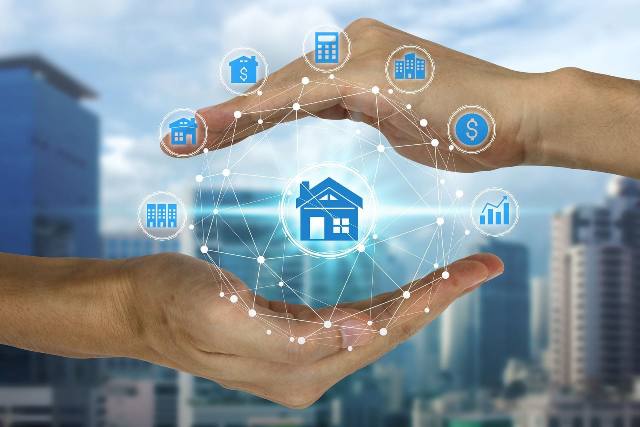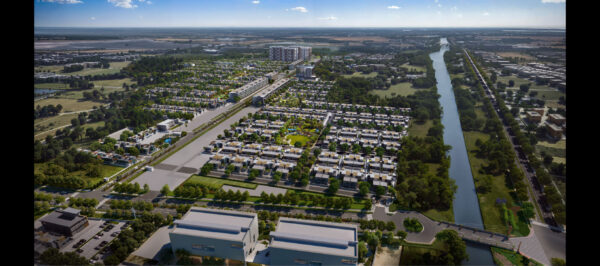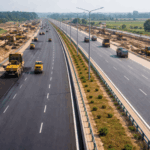Key technology trends revolutionising the Indian real estate sector
by Govind Krishnan Muthukumar, Co-founder & Director of Tridhaatu Realty & Infra
In today's digital age, technology has evolved from a backend enabler to a critical component of business strategy across industries. With the pandemic accelerating the digital transformation strategies of several business sectors, the Indian real estate industry has been no exception. The industry, generally known to be conservative in its approach, has been exemplary in terms of agility and quick adoption of the evolving tech-enabled market. Despite several setbacks, it has managed to adjust to the new normal using a variety of digital and technological methods.
The sector has shown promising growth and is expected to increase from $200 billion in 2021 to $1-trillion by 2030, and contribute 13% of the country's GDP by 2025. Technology and digitisation have aided real estate in its resilience and growth by stabilizing their existing business. Some technologies, whether for prospective buyers, real estate agents or property developers, may have a significant impact on the industry in the coming years, particularly in India.
Let’s take a look at the most recent technological advancements in the real estate sector, which have not only transformed the real estate industry, but also impacted its future.
Proptech
Proptech is the latest buzzword in the real estate sector today. Frequently referred to as the new disruption power and innovation driver, it’s turning out to be a much-needed modern solution for real estate professionals, who are burdened by mountains of paperwork and disassembled records spread across multiple spreadsheets. Proptech, or property technology, refers to technological tools that help to improve the way people buy, sell, research, market, and manage property. These cutting-edge tech tools, which are also referred to as Real Estate Tech, Retech, or Realtech, represent a strong alignment between real estate and technology. The government is also launching a number of initiatives to promote PropTech adoption in the sector.
Blockchain
Blockchain technology can be used to validate encrypted transactions and ensure that no tampering with financial records occurs. It will be useful in fractional property investment, allowing landlords to sell portions of their stake in a specific holding. Important documents, such as property titles, can also be securely stored as a result of this technology. As with other market sectors, the potential for using blockchain for different purposes in the real estate industry has only just begun.
Internet of Things (IoT)
The Internet of Things (IoT) enables faster connectivity and maximum automation of various real estate operations. Property managers and owners in the real estate market use IoT devices to monitor and control various aspects of a property and its surroundings, such as temperature, air quality, lighting levels and security systems, among others. There are several advantages to being able to control these variables in real-time. IoT devices, for example, can provide property managers with insights into the occupant’s behaviour and energy consumption, allowing them to be more proactive in property maintenance and repair.
Augmented reality & virtual reality
Augmented reality (AR) and virtual reality (VR) technology are not new to the real estate industry. However, the applications are constantly being improvised and gaining acceptance – from real estate advertising to home tours. By 2025, the AR and VR real estate market is expected to be worth at least $80 billion. The applications are quite varied and immersive in nature. VR headsets, for example, are being used in conjunction with 360-degree cameras to generate virtual property designs. Real estate agents are also providing new ways for buyers to view homes by using VR headsets. There are also AR programmes that allow property owners and agencies to see how their furniture and furnishings will look in real-time, and create augmented advertisements on properties. Buyers are already taking virtual tours of properties through real estate agents, which is especially helpful for out-of-town buyers. People can get a sense of what it's like to walk into the property without having to go there.
Drone surveillance
Drones are proving to be extremely useful in hazardous or dangerous work environments. The construction of a sprawling township or a skyscraper necessitates effective monitoring and strict vigilance, this is where revolutionary drone technology comes into play. Automated drones are extremely useful and easily navigable within the project's perimeter. It makes for an excellent supervisor due to its high precision cameras, ability to fly for hours at a time, and high-definition (HD) recording of events. I believe that drones will play a significant role in the construction industry in the near future. It can also be cost-effective for aerial mapping, topographical surveys, site surveys, and construction monitoring.
Building Information Modelling
The use of Building Information Modeling (BIM) software in the construction industry has recently increased exponentially. BIM software allows designers to create 3D mock-ups of planned structures, as well as critical information about costs and construction timelines. In my opinion, they can also help with the sequencing of complex projects, access granular insights, and calculate time and resources for each project step. BIM tools can be enhanced with VR devices to digitally visualize an under-construction project in stages, thus helping us make better decisions.
SaaS
Previously, Indian real estate developers seeking a technological advantage in their business had to rely on mainstream software giants that did not comprehend the unique needs of the Indian real estate industry. However, they now have the option of an integrated Customer Relationship Management solution delivered through Software as a Service – or SaaS, as it is now commonly known – created and managed by tech-driven real estate consultancies. I believe that by implementing SaaS, real estate developers will be able to immediately stop overspending and being diverted away from their core business. They can benefit from a technology platform that boosts project sales while also monitoring all sales activity in real-time.
Smart building materials
As technology has touched every aspect of our daily lives, there is an urgent need for new-age intelligent infrastructure, which are effectively future assets built through integrated technology innovation as well as delivering value-added, revenue-generating services while streamlining the processes that create buildings and developments. The new paradigm is led by green building materials and energy-efficient heating, ventilation, air conditioning (HVAC), and lighting systems. As cities grow in size, so will the demand for energy to power buildings, making measures like the revised Energy Conservation Building Code (ECBC) critical.
The real estate industry is constantly evolving, resulting in greater transparency and accountability. Many real estate organizations today, however, lack the fully integrated, end-to-end digital capabilities needed to compete in today's industry. Realtors must leverage technology in order to attract additional investment and propel the industry toward global standards.
















